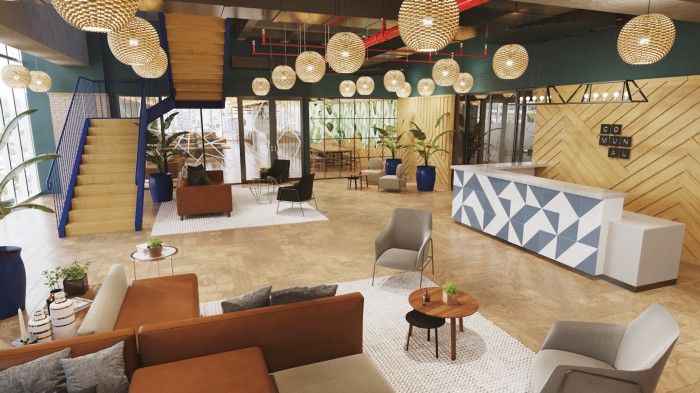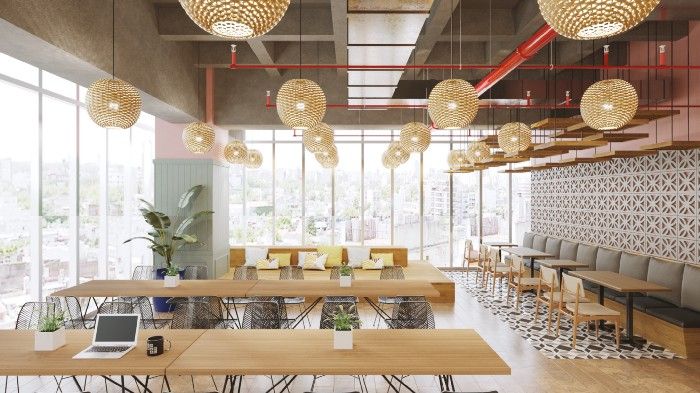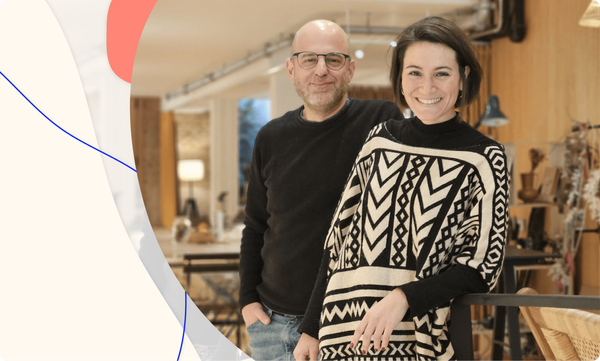Puedes leer este artículo en español aquí.
Read part 1: Co-creating a Better Future With Comunal - Part 1
I asked Ernesto a question that had been bugging me: Why use a .co domain for a space born in Peru? (Two-letter domains are national domains and .co is Colombia’s.) Was it a decision made from the heart (because of the implied meaning, like collaboration, coworking, community,…) despite the fact that it would harm their online positioning, especially at the beginning?
“Comunal was born as comunal.pe but someone hacked into our account and we lost it. It wasn’t too bad because I had been thinking for a while that we should target the region and not be seen as such a local player. When that happened they decided to move to comunalcoworking.com to boost the category “because at that time nobody understood what we were doing.”
In those years, it was common that not even the people in your family were clear about what you were doing. In fact, “my grandmother thought that I had some kind of mental problem when I left P&G” Ernesto explains, “and she told my mom ‘Little Ernesto is not ok… talk to him.’” Ernesto’s solution was to take his mother and grandmother on a tour through one of their spaces in Lima’s financial district so that both of them would understand.
Comunal positioned itself very well. “We built the coworking category in Peru but then we found that it had a bias towards small business.” Before you start objecting, Ernesto’s words does not refer to what coworking is or is not, but rather to the meaning that the greatest percentage of people associate with the term — it has to do with how you optimize your efforts. “When I started the project I give it a name and a surname: Communal Coworking. I created the category, I want to own that. But when I started to push big companies I told to myself now is the time to take it out and the reason for .co is exactly as you mentioned: it stands for collaboration, companies, collaboration,…”
Many local leaders from across Latin America are starting to make the jump to other countries. In the case of Comunal, their expansion has already begun and they have chosen Mexico City (CDMX) as their first stop. Although the potential of the Mexican market, and specifically that of CDMX, is beyond doubt, what would seem natural is to make the jump to a market like Bogotá: “the natural thing for Colombians, Peruvians and Chileans is to move within these three countries, but…
If you think about all the labor-hours you have to dedicate to open a new country, the most logical thing is to invest it where you can potentially have the greatest return. It is better to do it in the biggest city of the region (in coworking) and according to all the data I have analyzed this is Mexico City.
I can add two hours to the flight [compared to the flight to Bogotá] but I get a much bigger market. However, greater opportunity implies greater risk, since it is a market in which there are already well-established competitors that stand out in the region.” What is clear to me from Ernesto’s reasoning is that he does not back down from a good challenge.
That was just the first of three reasons that led him to the Mexican market. His background in mass market products provides the second: “It is a market that is very similar to the Peruvian one. We led many initiatives in Peru that were replicated in Mexico and just worked because the culture and consumer behavior is similar. I had been thinking about it for twelve years and it was natural for me that Mexico it would be the next country.”
The third and last reason Ernesto mentions is that they saw that his value proposal was relevant to Mexican companies: “Our differentiation is in the customer service and that we work the sense of community from the construction of the entrepreneurial ecosystem.”

In November 2019 they inaugurated their space on Insurgentes Sur Avenue (CDMX). “We had a very good start and we are waiting for the current situation [with COVID-19] to stabilize a little more to resume the upcoming openings.” I guess you can imagine what my next question was. “Days before the general lockdown of the country I had landed in Lima from Mexico City having almost closed my next location. Clearly the project was put in standby, and I still can’t reveal the location, but I’d like to take it up again soon.”
Far from the complication of some of its competitors’ websites, Comunal’s website is tremendously simple and communicates what it has to communicate. That’s all. There are only two partners that stand out: Endeavor and Grupo Wiese. I asked Ernesto about the relationship they have with both partners.
Of Endeavor they elaborate: We are part of the international Endeavor network, which allows us to have access to talent and their mentors in Lima, at the same time that it impels us to enter other markets. I wanted to know how this materializes in the day to day and expansion project of Comunal. “I’m in love with Endeavor: I think they have a spectacular purpose. I feel identified with that purpose and often depend on their support. Endeavor is a global network of entrepreneurs and basically what they do is push you to think big. Pre-Endeavor I was not even clear that I wanted to take Comunal to Latin America: for me it was a friend who made the suggestion and we did it. You feel cool saying you are an entrepreneur on the weekends when you have a full-time job with good corporate pay. When I went through the Endeavor process, which was enriching, I was challenged and told: ‘Why don’t you make it bigger? Why not Latin America?’”
This is where this new vision of what Comunal could become was born.
“When I entered Mexico, they helped me a lot, because you don’t have a name, you don’t have a track record, and in Latin America they ask you a lot of questions like: ‘Who are you? Who supports you?’ There is a certain level of mistrust in business and that is normal. In this sense, Endeavor is a good introduction. In fact, when I wanted to hire the first employees [in Mexico] it helped us attract talent because it gave them confidence.

One of the factors not discussed much in the industry is how WeWork’s failed IPO may have protected the sector to some extent from the COVID-19 crisis. Events in the second half of 2019 made many investors decide to be more cautious, and some coworking chains slowed down growth rates or halted them completely (except for launches they already had underway).
“There have been two major industry investment milestones in our business: the fall of WeWork pre-IPO and the second milestone is the current moment.”
The fall of WeWork, Ernesto tells us, drove away a group of investors, but those who had been “investing or analyzing our industry very thoroughly, who knew and understood the real drivers of it, fell even more in love with it.” That knowledge made them understand why WeWork fell:
“It grew at all costs, and that’s wrong. In technology you can grow at all costs and fix it later, because of the medium, but to grow in a business with a structure like ours, where you sign long term contracts, it is not easy to fix backwards.”
In fact, Ernesto confesses: “I have been in negotiations against them and they accepted a lot of space at an absurd price. The math didn’t work and then, when you saw their rates, you knew they were selling at a subsidized price.”
“This type of investor was more reassured after the fall of the US giant, since they had read the situation correctly, and this global player, which previously acted like a car without brakes, now has someone behind the wheel who is responsible and will not do anything crazy.
The next question was very clear: Did the investors who understood this business know [as did all of us who have been in the industry for some time] that the valuation of WeWork was wrong? “In my case I never used the valuation of WeWork as a reference to make an investment proposal. I always said: ‘Here are the responsible coworkings, and up here coming out of the curve is WeWork.’ I would disassociate myself from them, I would show them that I was from the scheme of the responsible ones and within that scheme I had my own set of valuations much more realistic. It was part of my pitch: I had to get away from them, to understand why they fell. I have to show my knowledge of the industry, that I understand why what happened happened.”
In summary, the fall of WeWork strengthened the investors who knew the industry. “[The investors who had deep knowledge of the market] were validated in their decision making, valuations were corrected, and the global player with their infinite wallet and irresponsible behavior is now in control.”

WeWork competition, in situations like the ones Ernesto mentioned above, caused the market to break down and it reminds me of a metaphor that Scott Galloway uses in the book The Four: The Hidden DNA of Amazon, Apple, Facebook, and Google when talking about Amazon. “Competing against Amazon is like having a competition to see who can dive the most, but Amazon dives with the largest oxygen tank in the world.”
“WeWork clearly expanded the category [in volume], but it destroyed value.
That same investor, at this stage, given the pandemic, is now analyzing how things are going: “You know very well, what they always criticized us for was how will [coworking] work in a crisis? Well… we are going through the test now and those investors are seeing not only those who are surviving, but those who are best prepared for the rebound.”
We continue to talk about the impact of COVID-19 and Ernesto responds: “I am a true believer, and this crisis is making me believe even more, that coworking and flexible offices are the future of work: This is the most efficient and intelligent way to consume workspace”.
“I am very sure that this crisis that we are living through is going to accelerate our industry much more strongly than before.”
“The accelerator until a year ago had clearly been WeWork, constantly pushing global growth disproportionately and crossing certain limits. They may have gone too far, but they boosted the category everywhere in the world, and that is real. But the next big driver of the category will be post-COVID-19 stabilization. Companies are realizing that they need flexible schemes, they need the flexibility to grow or shrink, to be able to combine remote work and central offices, to have rotating schemes over the workspaces. All this can only be given to you by our industry, only via flexible spaces, not by a traditional landlord.
This, far from being a simple theory, is backed up with real data from the information requests they receive. “The number of leads doubled from pre-pandemic times. Until a month ago the conversion was very low, there was a lot of interest but too much uncertainty, but since then people have already begun formalizing workspace contracts with us. Billing, for obvious reasons, is still in a valley but I think who can best endure this and who is best prepared for the rebound. That’s where our effort should be and that’s where we’re focusing, because whoever prepares better for the rebound is going to win.”
Next you can read the third and last instalment of this mini series with Ernesto de Olazával
If you aren’t already using Cobot as your coworking management software, give it a go! You’ll find that our features can help you run your coworking space more effectively and grow your community. Just sign up for a free trial or a live demo session. And if you have questions, our support team is all ears!
Happy Coworking!



